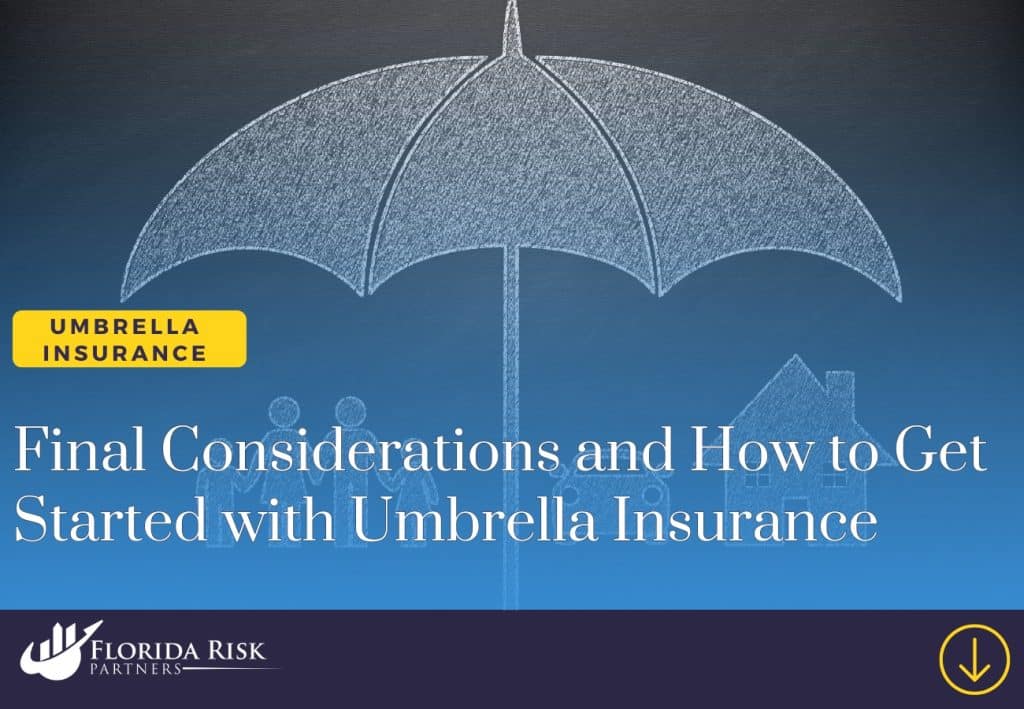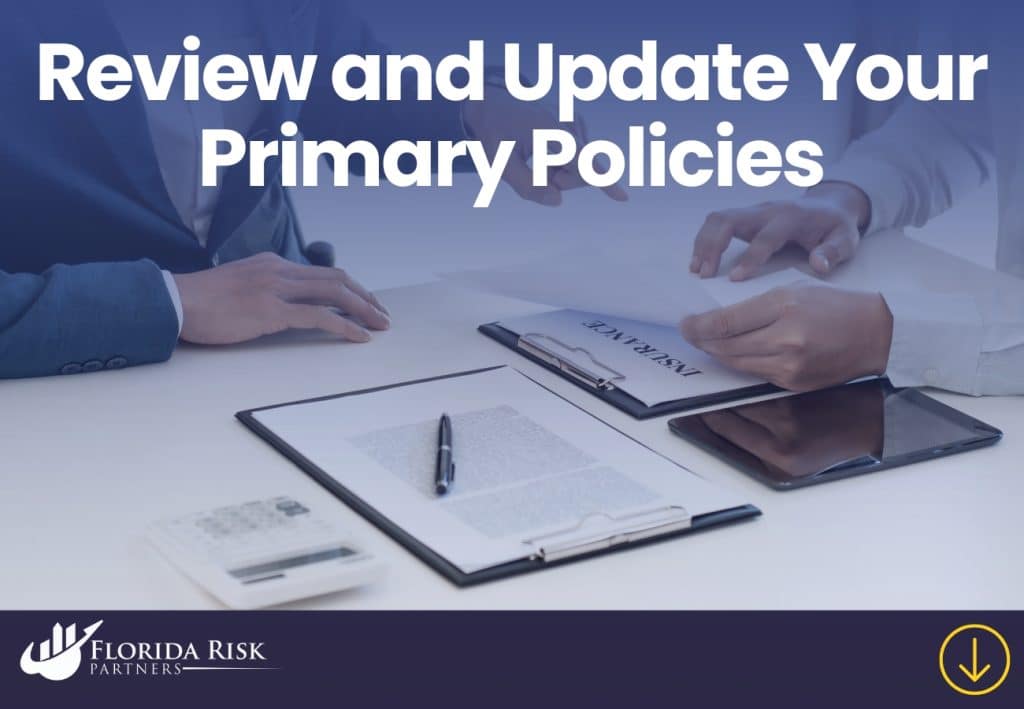-
Main Office: 1434 E. Bloomingdale Ave Valrico, FL 33596-6110
-
Phone: (888) 601-6660
-
Email: info@floridariskpartners.com

Umbrella insurance is a powerful tool for protecting your financial future, providing an extra layer of liability coverage that extends beyond your primary insurance policies, like homeowners or auto insurance. Over the past weeks, we’ve explored the many aspects of umbrella insurance, from its cost and coverage options to debunking common myths and understanding the claims process. Now, it’s time to bring it all together with some final considerations to help you make an informed decision and get started with umbrella insurance.
In this post, we’ll discuss key points to consider before purchasing an umbrella policy, review the benefits of umbrella coverage, and outline actionable steps to help you choose the right policy for your needs. By the end, you’ll have a clear path forward to enhance your financial protection and peace of mind.
Why Consider Umbrella Insurance?
Umbrella insurance provides critical protection in today’s world, where the financial impact of a lawsuit or high-liability claim can be devastating. From car accidents to personal injury claims, umbrella insurance offers extensive coverage that goes beyond what your primary policies provide. This added layer of protection is particularly valuable if you have significant assets or high earning potential, as it shields your assets and income from substantial financial losses.
Benefits of Umbrella Insurance
Umbrella insurance offers several important benefits that can help safeguard your finances:
- High Coverage Limits at Low Cost: For a relatively low premium, umbrella insurance provides millions of dollars in extra liability coverage, making it one of the most cost-effective forms of protection.
- Coverage for Non-Physical Injury Claims: Standard policies often don’t cover personal injury claims, such as slander or defamation. Umbrella insurance provides coverage for these scenarios, protecting you from lawsuits over non-physical damages.
- Protection of Future Earnings: If a judgment is made against you that exceeds your primary policy limits, umbrella insurance can cover the difference, preventing wage garnishment or asset liquidation to satisfy the claim.
- Comprehensive Legal Defense: Umbrella insurance covers legal defense costs for liability claims, whether or not you’re found liable, saving you from costly legal fees.
Whether you’re looking to protect assets you’ve worked hard to accumulate or want peace of mind knowing you’re prepared for the unexpected, umbrella insurance is a smart choice for those who prioritize financial security.
Key Considerations Before Buying Umbrella Insurance
Before purchasing umbrella insurance, it’s essential to evaluate a few key factors to ensure you select the right coverage for your unique needs.
1. Determine Your Total Asset Value

Understanding the value of your assets is crucial in determining how much umbrella insurance you need. Calculate the total value of your home, savings, investments, and other assets. Consider the financial impact if a large liability claim were to exceed your primary policy’s limits. Ideally, your umbrella insurance should cover at least the total value of your assets.
Example Calculation:
- Home Value: $500,000
- Savings and Investments: $250,000
- Valuable Personal Property: $50,000
- Other Assets: $50,000
- Total Asset Value: $850,000
In this case, a $1 million umbrella policy would provide adequate protection, covering the total value of your assets plus some additional coverage for unforeseen risks.
2. Assess Your Liability Exposure
Consider your lifestyle and activities, as they can influence your liability exposure. For instance, owning a pool or frequently hosting social events increases the risk of guest injuries, which can result in liability claims. Similarly, if you have teenage drivers in the household or own rental properties, your exposure to liability claims is higher.
High-Liability Scenarios to Consider:
- Teen Drivers in the Household: Teen drivers have higher accident rates, increasing the likelihood of large liability claims.
- Owning Rental Properties: Rental property ownership can lead to claims if tenants or their guests are injured.
- Public or High-Profile Presence: If you’re a public figure or frequently post on social media, there’s a higher chance of personal injury claims like defamation.
Evaluating your risk factors will help you determine whether a standard $1 million policy is sufficient or if a higher coverage limit, such as $2 million or $5 million, is more appropriate.
3. Understand the Minimum Requirements for Primary Policies
Most umbrella insurance providers require you to have specific minimum liability limits on your primary policies, such as homeowners and auto insurance. This is because umbrella insurance only kicks in once the primary policy’s limits are exhausted. Common minimums include:
- Homeowners Insurance: $300,000 in personal liability coverage
- Auto Insurance: $250,000 per person / $500,000 per accident for bodily injury and $100,000 for property damage
If your current policies don’t meet these minimums, you may need to increase them before purchasing umbrella insurance. Be sure to check these requirements with your insurer to avoid any surprises.
4. Evaluate the Cost of Coverage
The cost of umbrella insurance varies depending on factors like location, coverage limits, and individual risk factors. However, it’s generally quite affordable. For around $150 to $300 per year, you can get $1 million in coverage, with each additional million costing between $75 and $100.
When evaluating the cost, keep the following in mind:
- Bundling Discounts: Many providers offer discounts if you bundle umbrella insurance with other policies, such as homeowners or auto insurance.
- Risk Factors Impacting Premiums: If you have risk factors like a pool, a teenage driver, or own rental properties, your premium may be slightly higher.
Given the high coverage limits and the extensive protection it provides, umbrella insurance is one of the most cost-effective ways to enhance your financial security.
Steps to Get Started with Umbrella Insurance
Once you’ve evaluated your needs, the process of purchasing umbrella insurance is straightforward. Here are the steps to help you get started:
1. Contact Your Insurance Provider
Start by reaching out to your current insurance provider, as most offer umbrella insurance as an add-on to existing policies. If you already have homeowners or auto insurance, you may be able to bundle umbrella insurance for a discount. Discuss your needs with an insurance agent to get recommendations based on your unique situation.
2. Review and Update Your Primary Policies

If your primary policies don’t meet the minimum liability limits required for umbrella insurance, update these policies to qualify for coverage. For instance, if your auto insurance only provides $100,000 in bodily injury liability, you may need to increase it to $250,000 per person/$500,000 per accident to qualify.
3. Request Quotes and Compare Policies
Obtaining quotes from multiple insurers allows you to compare coverage options, premiums, and policy terms. Be sure to compare factors such as coverage limits, exclusions, legal defense provisions, and whether the provider offers any discounts for bundling.
4. Read the Fine Print
Each umbrella insurance policy is unique, so take the time to read the fine print. Pay close attention to:
- Exclusions: Review any specific exclusions that may affect your coverage.
- Legal Defense Coverage: Understand whether legal defense costs are included within or separate from your policy’s coverage limit.
- Deductibles or Retained Limits: Check if there are any deductibles or retained limits before your umbrella policy activates.
Understanding these details will help you select a policy that aligns with your needs and expectations.
5. Finalize and Integrate the Policy
Once you’ve selected a policy, your insurance agent will help integrate the umbrella policy with your primary policies, ensuring seamless coverage. Keep a copy of your policy documents for reference, and note any renewal dates to ensure continuous protection.
Final Thoughts: Why Umbrella Insurance is a Smart Investment
In a world where accidents, lawsuits, and large liability claims are increasingly common, umbrella insurance offers invaluable peace of mind and financial security. By providing coverage beyond the limits of your standard policies, umbrella insurance ensures that you’re protected from major financial setbacks.
A Quick Recap of Why Umbrella Insurance is Worth It:
- Affordability: For a small annual premium, umbrella insurance provides extensive coverage that’s otherwise out of reach with standard policies alone.
- Broad Protection: It covers not only physical injuries and property damage but also personal injury claims like defamation, slander, and invasion of privacy.
- Future Earnings Protection: It safeguards both your current assets and future income, offering a layer of protection that’s critical for anyone with earning potential.
- Legal Defense: Umbrella insurance covers legal defense costs, protecting you from significant financial strain in the event of a lawsuit.
By investing in umbrella insurance, you’re making a proactive decision to secure your financial stability and protect what matters most.
Ready to Enhance Your Protection? Here’s What to Do Next
If you’re ready to take the next step and secure your financial future with umbrella insurance, consider downloading our comprehensive e-book. This guide covers everything you need to know about umbrella insurance, including selecting the right coverage, understanding policy terms, and preparing for the unexpected.
Get our FREE comprehensive guide on personal umbrella insurance
Whether you’re looking to protect your assets, income, or simply gain peace of mind, umbrella insurance provides invaluable protection for today’s unpredictable world. Take the time to evaluate your needs, choose the right coverage, and enjoy the confidence that comes with knowing you’re prepared for life’s unexpected challenges.
Call Us Or
Schedule an Appointment
Select an agent below to view our online calendars and select a day and time that works best for you or call us directly at 888-601-6660. When you use our online calendars, you will receive an email with more information.



